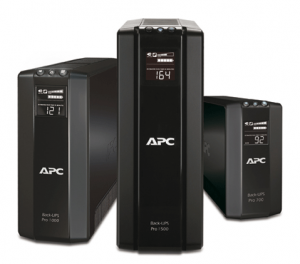Why Blackouts, Brownouts and Surges Can Be Bad
Before we look at how a UPS is beneficial, lets take a quick look at the three most common conditions that can happen on a power grid that can cause issues with home electronics.
Blackouts are one of the more annoying power issues that can happen during the winter months due to rain, winds and snow. Blackouts tend not to be very damaging on the equipment but they are extremely annoying as they tend to last longer than the other two. The issue is less about damage and more about with potential data loss from any work you might have been doing on a computer that wasn’t saved prior to the power going out. For someone like me that is writing all the time, this can mean some significant loss in work.
Brownouts are actually much more damaging to your home electronics and computers because the power continues to flow to the computer but at lower levels than the equipment is rated to handle. This is most obvious in lighting that tend to dim because of the reduced flow of electricity to the home. The most common damage is caused to the power supply to our electrical devices as the voltage sags cause issues with the circuitry that attempts to regulate the different voltages that are required of internal components of the electronics. This damage to the power supply generally is not fatal right away but can lead to erratic behavior of the device and premature failure of the power supply.
Finally, surges are any situation that causes excess power to flood into a home. A good example of such an instance is a lighting strike on the power grid at or around of home. If not properly grounded, this can cause major catastrophic damage to electric appliances and electronics.
What a UPS Does to Mitigate These Problems
The best way to describe a UPS is as a two stage power system. The first part regulates power that comes from the power grid to keep the battery inside of the UPS charged. This watches for the fluctuations in the power line and makes corrections as necessary. The second stage of the system is the power that flows from the battery to those devices that are connected to the battery backup plugs.
In essence, the electronics are always receiving power from the battery which in turn is constantly charged by the power grid. In the event of the power grid issues, the first stage of the power system halts flow of power to protect the battery. The battery then continues to supply power to the electronics as long as it can supply sufficient output voltage at the requested load. This is important to consider as the size of the battery compared to the load on it determines how long the devices can be powered.
Determining How Large of a UPS You Need
UPS backups come in a variety of different battery capacities. They are generally rated by a something called VA or volt amps. This is essentially a way of saying how much load can be pulled from the battery at a specific power level. It is not something that many people can easily figure out as most of their devices simply list watts and not VA. Instead, I recommend that people use a calculator system such as the by APC. This will walk you through what devices you want to put on a UPS and then determine what options may best suit what you are looking at.
One thing to think about is that you don’t have to put everything on a single UPS. In some cases, it may actually be beneficial to have more than one UPS especially if you have a large power drawing devices. For instance, I have a fairly powerful desktop computer system plus a 27-inch Dell monitor that draws a fair amount of power. I have them on a single 1500VA rated UPS but that only provides me with around 5 minutes of running time. Enough to get things saved and shut down. It might be more cost effective for me to buy a pair a pair of UPS such as a 1000VA unit and 500VA unit and put the desktop on the larger and the monitor on the smaller to get a potentially longer running time.
What You Should Not Use a UPS With
There are some devices that just are not suited for use with a UPS because of their potential high power draws. The most common instance of such a device is a laser printer. They have a fuser that needs to heat up to high temperatures to properly fuse the toner to the paper. When the printer warms up, it draws very high amounts of power that will overload just about any UPS causing it to shut down. As a result, most UPS devices also feature a couple of non-backup plugs so devices like this can be plugged in and protected against the surges but will not impact the performance of the UPS.
I also do not recommend that home theater equipment be used with a UPS. Amplifiers and modern HDTVs just draw too much power such that it is impractical to set them up with a UPS. To do so would require such a large battery that the cost could easily outstrip that of the gear you are protecting and only for the potential of running a couple of minutes.


